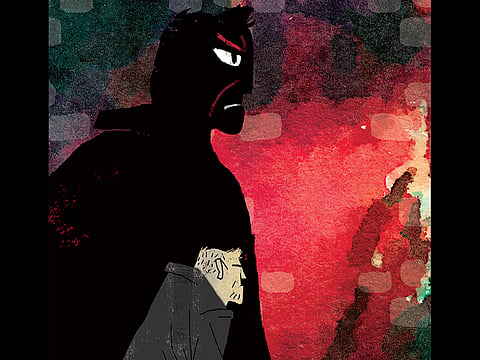The lady has a past
J.K. Rowling brings the heroine of her murder-mystery series into sharper focus

Career of Evil
By Robert Galbraith, Mulholland Books, 512 pages, $28
The death of Cedric Diggory is one of the most interesting moments of J.K. Rowling’s very, very interesting career. It comes almost exactly at the midway point of the “Harry Potter” novels, after Harry and his friends have successfully thwarted Voldemort several times already; on this occasion, though, Cedric, innocent of any involvement in their enmity, happens to be present. “Kill the spare,” Voldemort says, and there he goes, murdered, the first truly substantial character in the series whose death we see in real time.
Children’s stories are often powerfully reassuring. You don’t control much when you’re young, and your fears can be so vivid that it’s a relief to see them first adduced and then defeated in a book, a movie. When Rowling wrote the words “the spare”, though — a chilling turn of phrase, capturing all the jaded obscenity of Voldemort’s violence — she refused to offer any longer the comforting pattern of peril and triumph that she had in Harry’s earlier adventures. Not everybody was going to make it back to the shire.
What Rowling writes these days, under the pen name Robert Galbraith, are crime novels: the closest equivalent adults have to the apotropaic formula of childhood literature, parading the unimaginable in front of us and then solving it, stabilising it. It seems clear, perhaps, that Rowling feels at home as a writer in a certain kind of consoling narrative. But it also seems clear that she’s honest enough to push back against the self-deceptions that lurk within it.
This feeling of resistance is what gives such emotional depth to “Career of Evil”, her gripping third novel about the private investigative team of Cormoran Strike and Robin Ellacott, which (especially in its subtle shift of focus towards Robin) achieves a new candour about the gap between solving crimes and repairing their damages.
The first two Galbraith books established Strike and Robin’s relationship. He’s a big, lumpy veteran who lost part of his leg during a stint with the military police in Afghanistan, astute but matter-of-fact and also very attractive to women, despite looking like Beethoven “with a [expletive] nose”. At the outset of the series, his one-man London detective agency needs some temp help, and Robin arrives. She’s beautiful, capable if a little shaky in her confidence, and soon enough indispensable.
In “The Cuckoo’s Calling” and “The Silkworm”, Strike and Robin work together to solve the murders of a model and an infamous author — occasion for Rowling to offer some tart interpretations of celebrity culture and literary envy, and more seriously to establish the appealing, believable friendship of her two central characters.
As “Career of Evil” begins, a package arrives at their Denmark Street office. It holds a woman’s severed leg, plainly a message for Strike, it would seem, given his disability. He comes up with a list of people from his life who might be responsible. (Robin, sounding a bit like Ron Weasley, says: “You know four men who’d send you a severed leg? Four?”)
Rowling alternates their search for these men with a sequence of dark, finely drawn chapters from the perspective of their psychotic stalker, a murderer of women whose next target, it soon becomes obvious, is Robin.
This makes Strike worry, which is the perfect way for Rowling to put new pressure on the pair. Robin’s marriage to her high-school sweetheart is approaching, but she’s ambivalent about it, while Strike doesn’t even quite dare to articulate to himself his feelings for his partner.
The seamless way Rowling integrates these personal and professional story lines makes “Career of Evil” an absorbing book, pulpy, fast and satisfying. Imperfect, too, in fairness — Rowling calibrated her prose carefully in “The Casual Vacancy”, as if to show she could do it, but her old infelicities of language have returned. On the other hand, her powers of observation have grown sharper. She can effortlessly evoke the vulnerability of a teenage girl, for instance, “the slenderness of her twiglike legs”, and how it’s “emphasised by her clumpy trainers”.
The previous two books were also observant and engaging, though. When “Career of Evil” feels special — a step forward for a series that has been more concerned with entertainment than complexity at times — it’s when the book’s attention settles on Robin, finally developed here as a true equal of Strike.
There were moments, before, when her character felt thin, tolerating her fiancé’s condescension about her job, fretting about whether she might make a career alongside Strike. In fact, as Rowling slowly and masterfully reveals in this novel, redefining a character we thought we’d known, that apparent diffidence stems from a traumatic experience: as an undergraduate, Robin was raped. Suddenly, after three books, we understand why she clings to her irritating boyfriend, and why even modest steps in her career are so crucial to her sense of self-worth.
The rape occurred because, as the book heartbreakingly puts it, Robin was “in the wrong stairwell at the wrong time”. It’s a phrase you could adapt to Cedric Diggory’s death, and while “Career of Evil” works superbly as a pure murder mystery, in Robin’s development Rowling finds a larger theme, too — the terrible ongoingness and untidiness of life, the ways in which catching a criminal doesn’t necessarily finish a crime, only a book.
This fresh scope makes for the best novel she has written as Robert Galbraith. It’s not Harry Potter; that universe is an irreplicable astonishment. The good news is that its creator evidently has some magic left.
–New York Times News Service
Charles Finch is the author of “Home by Nightfall”.


